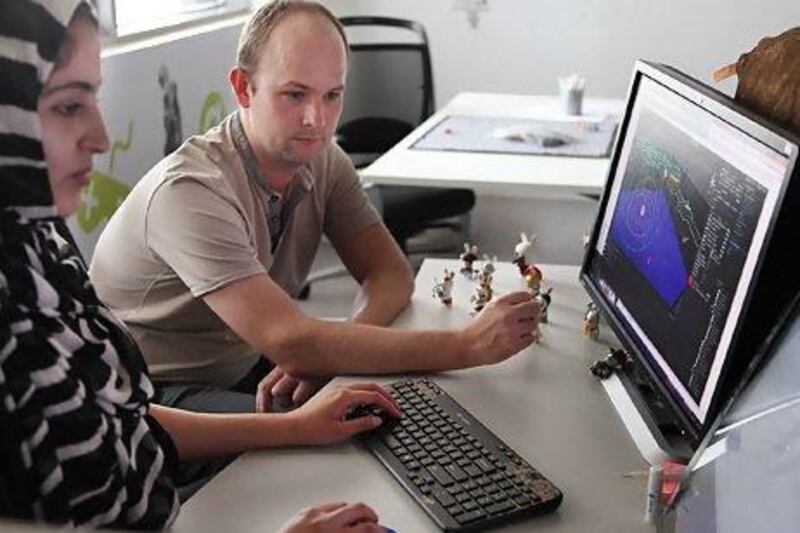ABU DHABI // The first locally trained computer-game designers are about to graduate.
The eight students at twofour54's Gaming Academy are just weeks away from completing their 16-month course.
Some hope to secure jobs here and build up the country's fledgling games industry but others are looking overseas to more established markets.
The academy was set up in collaboration with a French game developer, Ubisoft, responsible for awarding-winning titles such as Assassin's Creed and Prince of Persia.
While the UAE's game design industry is expected to grow rapidly in the coming years, most of the jobs created will initially be for experienced staff rather than new graduates.
Ubisoft has 28 employees at its Abu Dhabi base but hopes to have 100 in the next three to five years.
In 2011 it became the first major international video game company to open a studio in the region.
It plans to offer internships to some of the graduates and while the number of places has not been fixed, it is unlikely all eight will be accommodated.
Yannick Theler, general manager for Ubisoft in the UAE, said the company would assess the students' capabilities before a final decision was made.
"We are looking first of all at what they know and what skills have they acquired," he said. "We need to know if they will fit into the philosophy of the company and if they will be able to work with our programmers and artists."
The students understand they are entering an global industry that is still in its infancy in the UAE.
Nassib Azar, from Lebanon, was an architect in Dubai for 10 years before he decided to change career.
"I switched to gaming for something closer to home so to speak. I've always been a gamer, since the days of the Atari," he said.
"Creating games and creating worlds is something I've always wanted to do."
Mr Azar admitted he was concerned about his employment prospects.
"Ubisoft really is the holy grail, so to speak. If I don't get in there, it is a little tougher for me because I have a family here," he said. "I need to look at costs of living and if my wife can find a job overseas."
Hadeel Miqdadi, an Emirati graduate of Science in Multimedia Design, said that while her immediate goal was to work for Ubisoft Abu Dhabi, she eventually wanted to work for Sega, "which is a company I really respect".
Her compatriot, Fakhra Al Mansouri, said she had relished her experience with twofour54.
"Ideally I'd love a position with Ubisoft, a lot of their games had a lot of influence on me," she added.
But she would not mind moving overseas if an opportunity was not available closer to home.
Matthew Bell, head lecturer at the Gaming Academy, believes it will take between five and 10 years for the region's gaming industry to flourish.
"This is the start of the road, to try to develop the region's development scene," he said, adding he was confident "we can get a world-acclaimed studio here" that his students could be part of.
He drew a parallel with the industry in Singapore, where Ubisoft opened a similar studio in 2008, under similar industry conditions.
It has gone on to work on some of the company's most lucrative and popular titles.
The Gaming Academy will hold an open day on Tuesday as it starts to recruit its next intake of 12 students.






